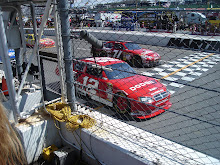Before I get into the bulk of this post, I feel I should acknowledge that I understand how big-time college sports -- football specifically -- work. I understand that coaches rarely work through the duration of their contract, either because they get fired or leave for a better job or what not. I also understand that recruits sometimes have to decide whether to stand by their commitment when the coach who sold them on the program bolts to another school.
Really, I get that. I understand how it works.
But still ... is there a sleazeball in college sports bigger than Lane Kiffin today? After one season -- and a myriad of promises -- at Tennessee, Kiffin is on his way back to the University of Southern California, where he will replace Pete Carroll after the latter decided to give the NFL another try with the Seattle Seahawks.
I have no problem with Carroll leaving; he gave USC nine glorious years, bringing the program back from irrelevancy to win seven Pac-10 titles, two national championships and turning the Trojans into a bonafide NFL factory. Kiffin was part of that fun, serving as offensive coordinator from 2001-06 before becoming the head coach of the Oakland Raiders.
What's more, Carroll waited until the season was over, and he was honest the whole way. There's a right way to leave one job for another, and there's a wrong way. Carroll left USC the right way; Bobby Petrino left the Atlanta Falcons two years ago the wrong way, bolting before his first season was even over. Nick Saban left the Miami Dolphins a couple years ago the wrong way, running to Alabama after two years in Miami -- and weeks of insisting that he would not be the coach at Alabama.
But Kiffin sets the new standard for screwing over a program. When Kiffin was hired by Tennessee in December 2008, he immediately embraced Volunteer traditions -- so much so, he promised to sing "Rocky Top" all night long after Tennessee beat Florida.
Florida beat Tennessee this past season 23-13.
Kiffin's energetic style and brash personality won over boosters and recruits -- if not necessarily in accordance with NCAA regulations -- and he made it known to anyone who would listen that he would eventually lead the Volunteers back to national prominence; a point he reiterated even after Tennessee lost the Chik-fil-A Bowl to Virginia Tech last month. Kiffin's whole tenure at Tennessee, sickeningly brief as it was, was predicated on the belief that he would be the man to return the Volunteers to the upper echelon of big-time college football.
Everyone at Tennessee ate it up, the passion of the SEC combining with the frustration of watching Florida and Alabama pass the Volunteers by leading the fan base to think Kiffin was going to do the things he said he would do.
But how does Kiffin expect to return Tennessee to national prominence from USC?
To be fair, Kiffin was a really good salesman -- so much so, recruiting coordinator Ed Orgeron was reportedly on the phone with Tennessee commits while Kiffin was announcing his departure Tuesday night offering them scholarships to USC. Which is the whole problem; how can Kiffin look a recruit and his parents in the eye and talk about commitment and loyalty when he bolted Tennessee the second a better job opened up?
I don't blame USC for going after Kiffin; the Trojans needed a new coach, their first few choices passed on the opening and the school thought hiring someone who had been successful within the program in the past was a good way to go. The problem lies with Kiffin -- and every other college coach who thinks loyalty is just a buzzword to feed his players and not something he actually has to practice.
It says something that Tennessee women's basketball coach Pat Summit, one of the classiest and nicest people you'll ever meet, went on
Mike & Mike in the Morning on Wednesday and expressed her own disappointment and outrage with regards to Kiffin's decision.
This isn't simply a case of leaving one job for another -- that happens all the time, in every facet of life. Kiffin made a commitment to the University of Tennessee, and he broke that commitment before the ink on the contract had a chance to dry. Considering everything surrounding Kiffin in the past year -- between the NCAA violations and this latest betrayal -- maybe Raiders owner Al Davis was right in firing him for cause.
When Al Davis is right, you know there's something horribly, horribly wrong.
UPDATE: An interesting -- and scathing -- opinion from Tennessee grad and ESPN.com national columnist Gene Wojciechowski can be found
here. Give it a read.

